EMP2020 Critical Reflection: Skills, Growth, and Strategies
VerifiedAdded on 2022/09/13
|7
|2175
|14
Report
AI Summary
This report presents a critical reflection on the development of graduate attributes, as required for the EMP2020 course. The student evaluates their proficiency in various skills, including ethical research, problem-solving, communication, and interpersonal abilities. The report details how these skills were acquired through academic, professional, and extracurricular experiences. It identifies areas for improvement, such as written communication and research methods, and proposes specific strategies to address these skill gaps. These strategies include reading journals and books, accessing electronic databases, and engaging in cultural literacy activities. The report also outlines a plan for enhancing management, organization, and planning skills. The student concludes by emphasizing the importance of self-assessment and the development of a constructive plan for future professional success. The assignment is contributed by a student and available on Desklib, a platform offering AI-powered study tools for students.
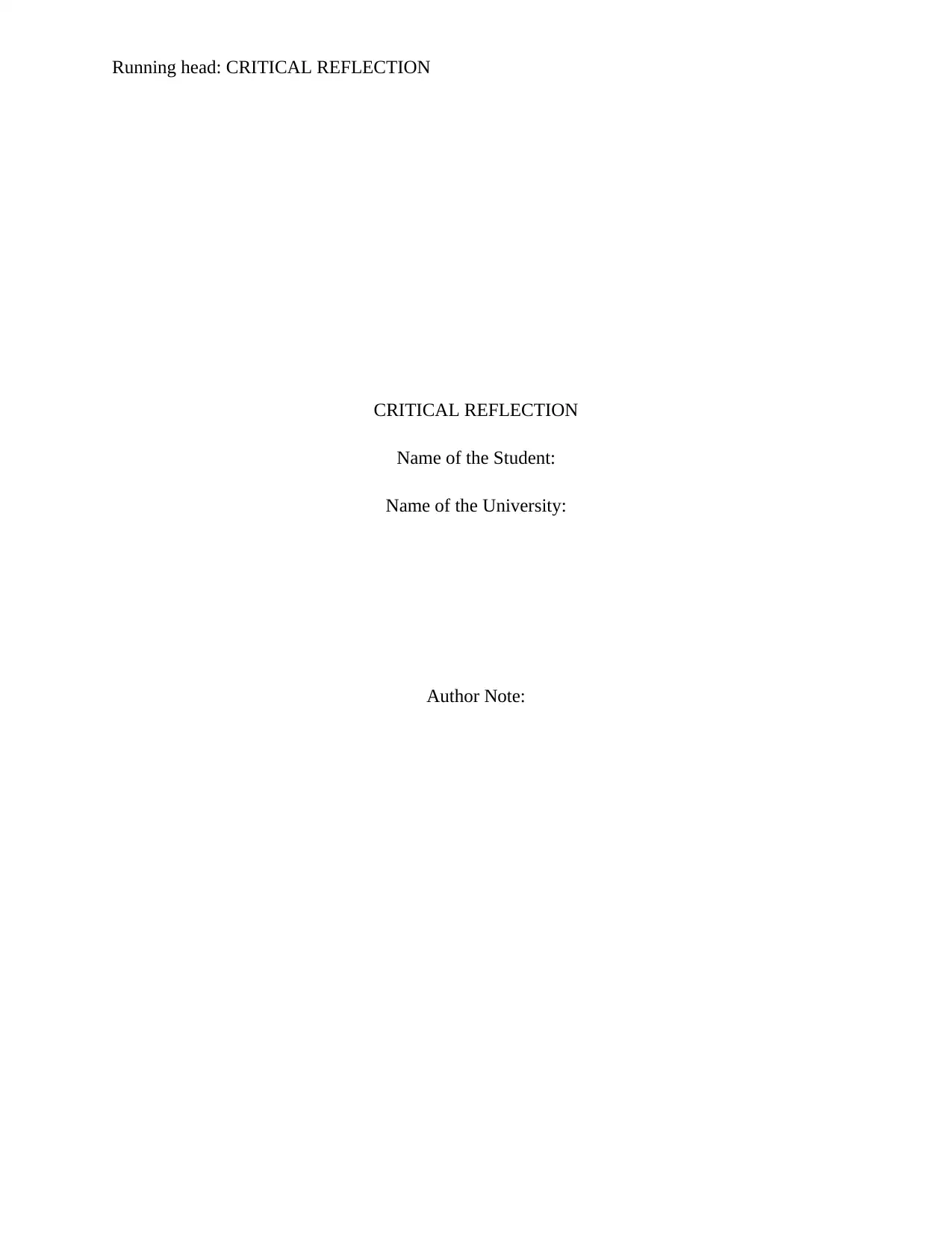
Running head: CRITICAL REFLECTION
CRITICAL REFLECTION
Name of the Student:
Name of the University:
Author Note:
CRITICAL REFLECTION
Name of the Student:
Name of the University:
Author Note:
Paraphrase This Document
Need a fresh take? Get an instant paraphrase of this document with our AI Paraphraser
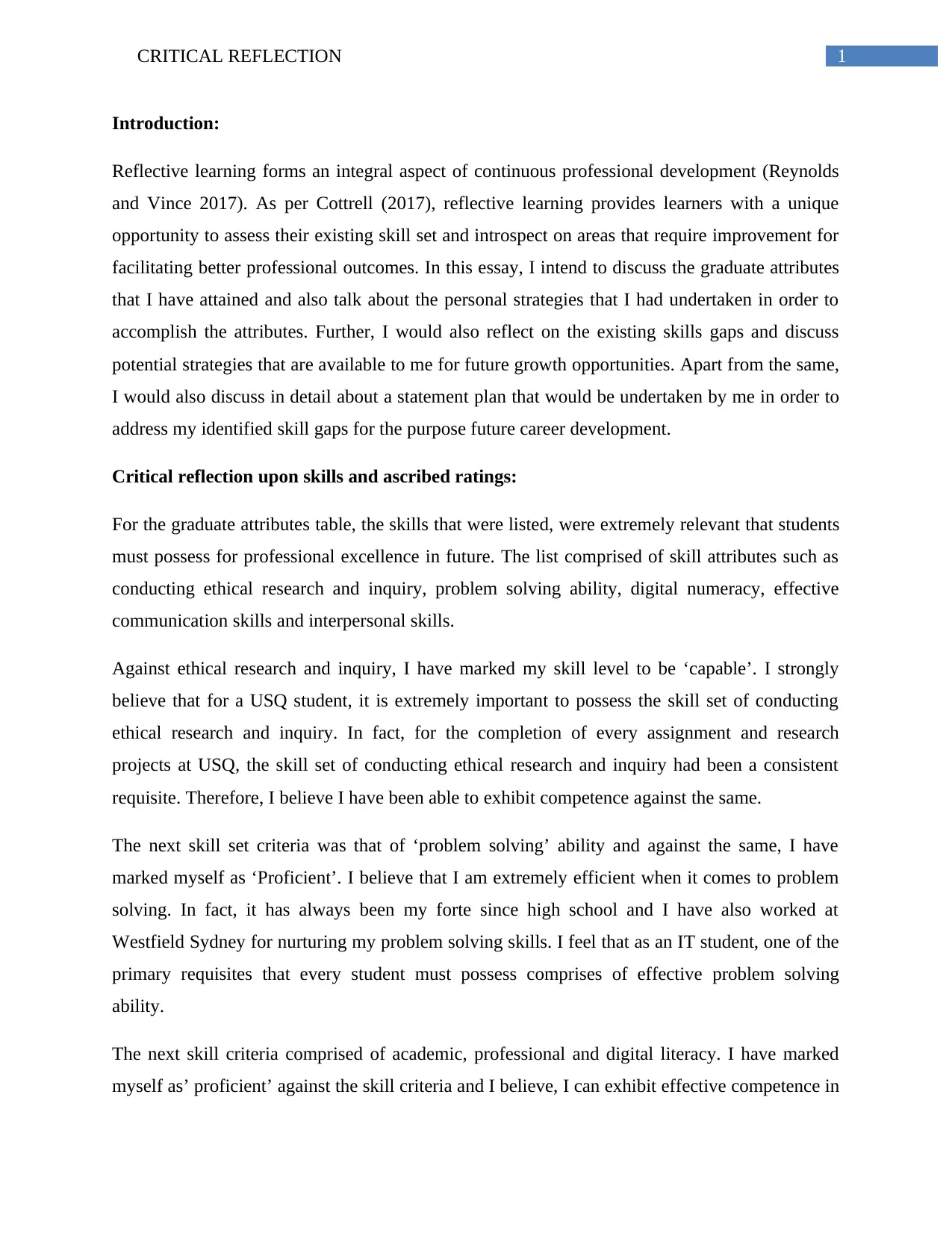
1CRITICAL REFLECTION
Introduction:
Reflective learning forms an integral aspect of continuous professional development (Reynolds
and Vince 2017). As per Cottrell (2017), reflective learning provides learners with a unique
opportunity to assess their existing skill set and introspect on areas that require improvement for
facilitating better professional outcomes. In this essay, I intend to discuss the graduate attributes
that I have attained and also talk about the personal strategies that I had undertaken in order to
accomplish the attributes. Further, I would also reflect on the existing skills gaps and discuss
potential strategies that are available to me for future growth opportunities. Apart from the same,
I would also discuss in detail about a statement plan that would be undertaken by me in order to
address my identified skill gaps for the purpose future career development.
Critical reflection upon skills and ascribed ratings:
For the graduate attributes table, the skills that were listed, were extremely relevant that students
must possess for professional excellence in future. The list comprised of skill attributes such as
conducting ethical research and inquiry, problem solving ability, digital numeracy, effective
communication skills and interpersonal skills.
Against ethical research and inquiry, I have marked my skill level to be ‘capable’. I strongly
believe that for a USQ student, it is extremely important to possess the skill set of conducting
ethical research and inquiry. In fact, for the completion of every assignment and research
projects at USQ, the skill set of conducting ethical research and inquiry had been a consistent
requisite. Therefore, I believe I have been able to exhibit competence against the same.
The next skill set criteria was that of ‘problem solving’ ability and against the same, I have
marked myself as ‘Proficient’. I believe that I am extremely efficient when it comes to problem
solving. In fact, it has always been my forte since high school and I have also worked at
Westfield Sydney for nurturing my problem solving skills. I feel that as an IT student, one of the
primary requisites that every student must possess comprises of effective problem solving
ability.
The next skill criteria comprised of academic, professional and digital literacy. I have marked
myself as’ proficient’ against the skill criteria and I believe, I can exhibit effective competence in
Introduction:
Reflective learning forms an integral aspect of continuous professional development (Reynolds
and Vince 2017). As per Cottrell (2017), reflective learning provides learners with a unique
opportunity to assess their existing skill set and introspect on areas that require improvement for
facilitating better professional outcomes. In this essay, I intend to discuss the graduate attributes
that I have attained and also talk about the personal strategies that I had undertaken in order to
accomplish the attributes. Further, I would also reflect on the existing skills gaps and discuss
potential strategies that are available to me for future growth opportunities. Apart from the same,
I would also discuss in detail about a statement plan that would be undertaken by me in order to
address my identified skill gaps for the purpose future career development.
Critical reflection upon skills and ascribed ratings:
For the graduate attributes table, the skills that were listed, were extremely relevant that students
must possess for professional excellence in future. The list comprised of skill attributes such as
conducting ethical research and inquiry, problem solving ability, digital numeracy, effective
communication skills and interpersonal skills.
Against ethical research and inquiry, I have marked my skill level to be ‘capable’. I strongly
believe that for a USQ student, it is extremely important to possess the skill set of conducting
ethical research and inquiry. In fact, for the completion of every assignment and research
projects at USQ, the skill set of conducting ethical research and inquiry had been a consistent
requisite. Therefore, I believe I have been able to exhibit competence against the same.
The next skill set criteria was that of ‘problem solving’ ability and against the same, I have
marked myself as ‘Proficient’. I believe that I am extremely efficient when it comes to problem
solving. In fact, it has always been my forte since high school and I have also worked at
Westfield Sydney for nurturing my problem solving skills. I feel that as an IT student, one of the
primary requisites that every student must possess comprises of effective problem solving
ability.
The next skill criteria comprised of academic, professional and digital literacy. I have marked
myself as’ proficient’ against the skill criteria and I believe, I can exhibit effective competence in
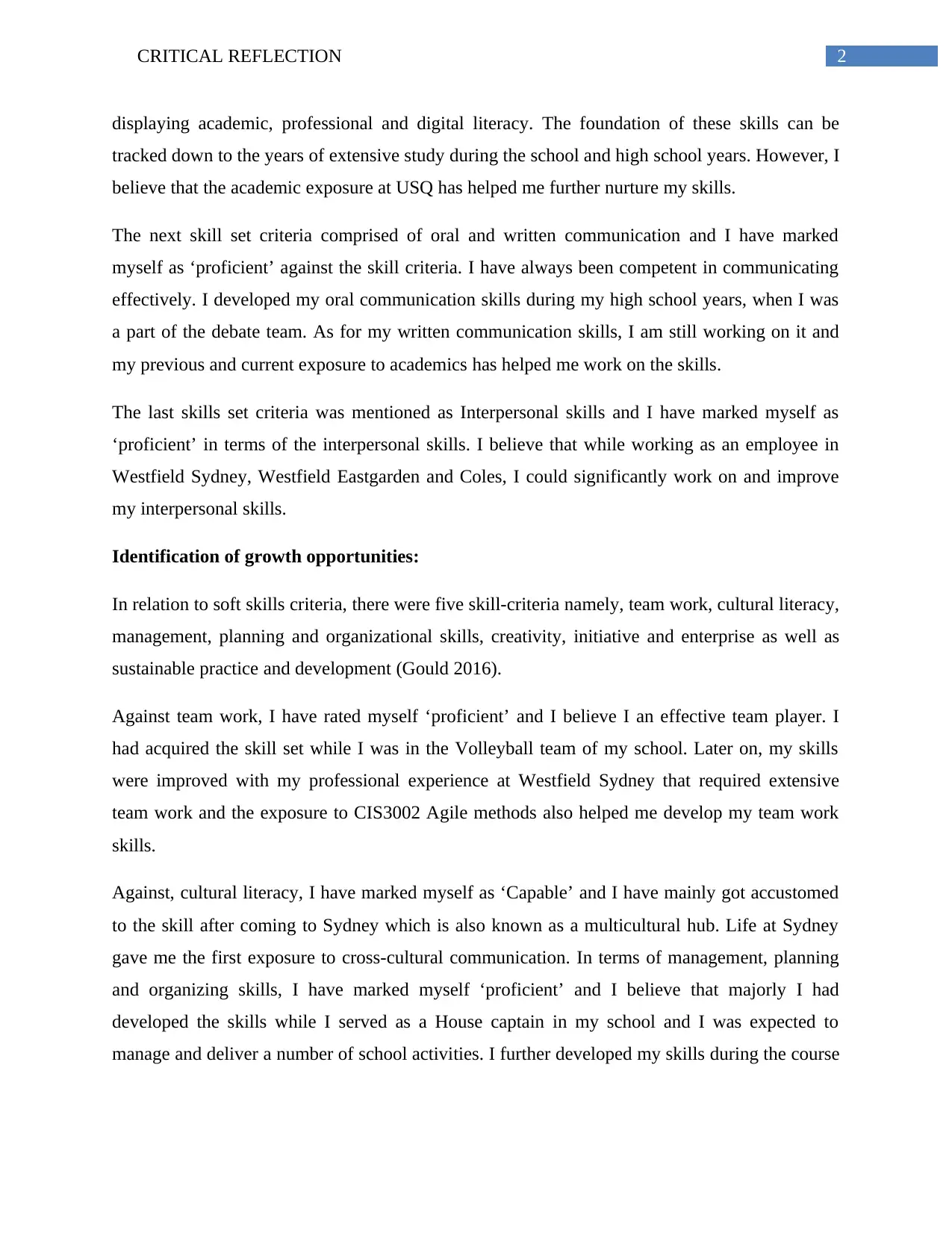
2CRITICAL REFLECTION
displaying academic, professional and digital literacy. The foundation of these skills can be
tracked down to the years of extensive study during the school and high school years. However, I
believe that the academic exposure at USQ has helped me further nurture my skills.
The next skill set criteria comprised of oral and written communication and I have marked
myself as ‘proficient’ against the skill criteria. I have always been competent in communicating
effectively. I developed my oral communication skills during my high school years, when I was
a part of the debate team. As for my written communication skills, I am still working on it and
my previous and current exposure to academics has helped me work on the skills.
The last skills set criteria was mentioned as Interpersonal skills and I have marked myself as
‘proficient’ in terms of the interpersonal skills. I believe that while working as an employee in
Westfield Sydney, Westfield Eastgarden and Coles, I could significantly work on and improve
my interpersonal skills.
Identification of growth opportunities:
In relation to soft skills criteria, there were five skill-criteria namely, team work, cultural literacy,
management, planning and organizational skills, creativity, initiative and enterprise as well as
sustainable practice and development (Gould 2016).
Against team work, I have rated myself ‘proficient’ and I believe I an effective team player. I
had acquired the skill set while I was in the Volleyball team of my school. Later on, my skills
were improved with my professional experience at Westfield Sydney that required extensive
team work and the exposure to CIS3002 Agile methods also helped me develop my team work
skills.
Against, cultural literacy, I have marked myself as ‘Capable’ and I have mainly got accustomed
to the skill after coming to Sydney which is also known as a multicultural hub. Life at Sydney
gave me the first exposure to cross-cultural communication. In terms of management, planning
and organizing skills, I have marked myself ‘proficient’ and I believe that majorly I had
developed the skills while I served as a House captain in my school and I was expected to
manage and deliver a number of school activities. I further developed my skills during the course
displaying academic, professional and digital literacy. The foundation of these skills can be
tracked down to the years of extensive study during the school and high school years. However, I
believe that the academic exposure at USQ has helped me further nurture my skills.
The next skill set criteria comprised of oral and written communication and I have marked
myself as ‘proficient’ against the skill criteria. I have always been competent in communicating
effectively. I developed my oral communication skills during my high school years, when I was
a part of the debate team. As for my written communication skills, I am still working on it and
my previous and current exposure to academics has helped me work on the skills.
The last skills set criteria was mentioned as Interpersonal skills and I have marked myself as
‘proficient’ in terms of the interpersonal skills. I believe that while working as an employee in
Westfield Sydney, Westfield Eastgarden and Coles, I could significantly work on and improve
my interpersonal skills.
Identification of growth opportunities:
In relation to soft skills criteria, there were five skill-criteria namely, team work, cultural literacy,
management, planning and organizational skills, creativity, initiative and enterprise as well as
sustainable practice and development (Gould 2016).
Against team work, I have rated myself ‘proficient’ and I believe I an effective team player. I
had acquired the skill set while I was in the Volleyball team of my school. Later on, my skills
were improved with my professional experience at Westfield Sydney that required extensive
team work and the exposure to CIS3002 Agile methods also helped me develop my team work
skills.
Against, cultural literacy, I have marked myself as ‘Capable’ and I have mainly got accustomed
to the skill after coming to Sydney which is also known as a multicultural hub. Life at Sydney
gave me the first exposure to cross-cultural communication. In terms of management, planning
and organizing skills, I have marked myself ‘proficient’ and I believe that majorly I had
developed the skills while I served as a House captain in my school and I was expected to
manage and deliver a number of school activities. I further developed my skills during the course
⊘ This is a preview!⊘
Do you want full access?
Subscribe today to unlock all pages.

Trusted by 1+ million students worldwide
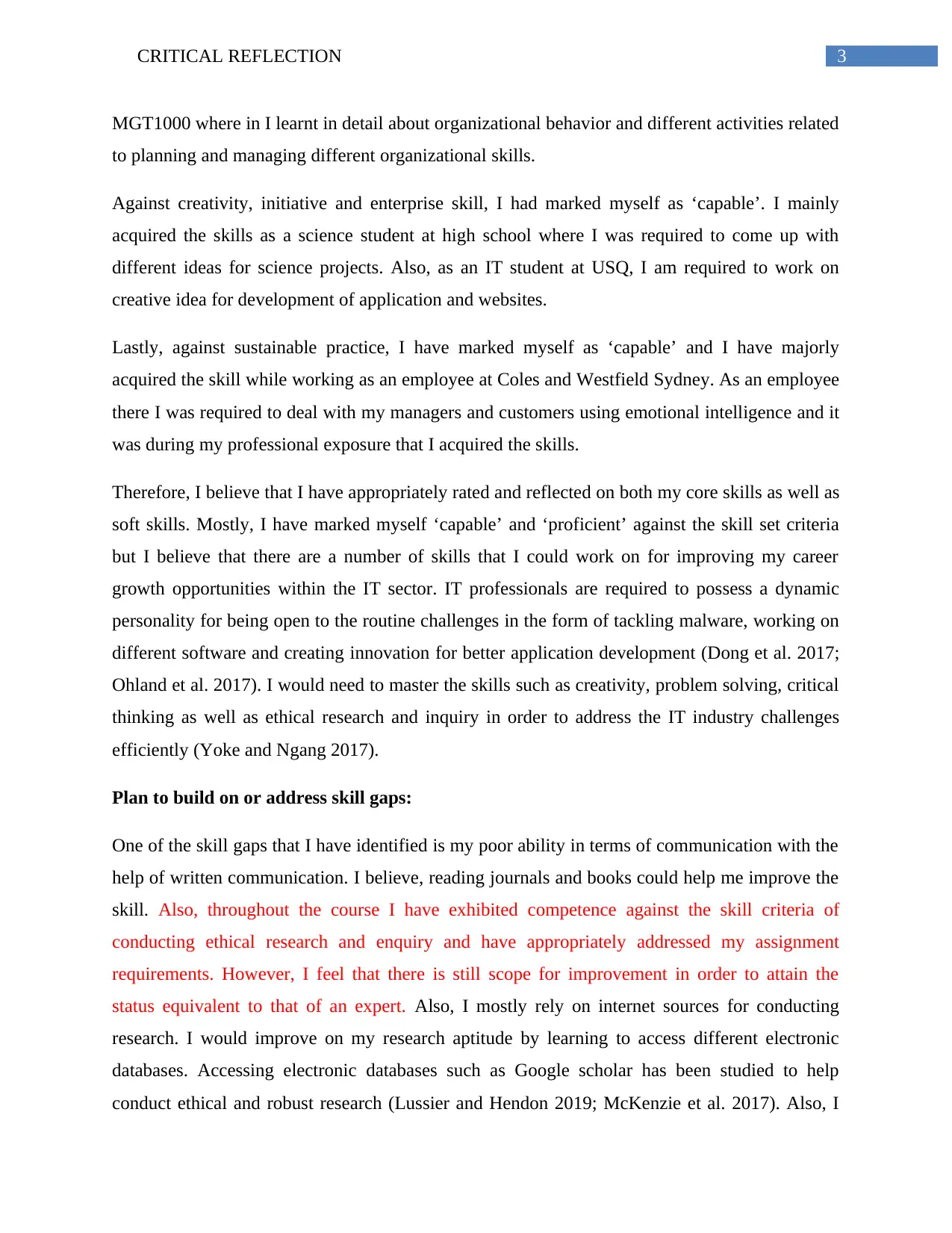
3CRITICAL REFLECTION
MGT1000 where in I learnt in detail about organizational behavior and different activities related
to planning and managing different organizational skills.
Against creativity, initiative and enterprise skill, I had marked myself as ‘capable’. I mainly
acquired the skills as a science student at high school where I was required to come up with
different ideas for science projects. Also, as an IT student at USQ, I am required to work on
creative idea for development of application and websites.
Lastly, against sustainable practice, I have marked myself as ‘capable’ and I have majorly
acquired the skill while working as an employee at Coles and Westfield Sydney. As an employee
there I was required to deal with my managers and customers using emotional intelligence and it
was during my professional exposure that I acquired the skills.
Therefore, I believe that I have appropriately rated and reflected on both my core skills as well as
soft skills. Mostly, I have marked myself ‘capable’ and ‘proficient’ against the skill set criteria
but I believe that there are a number of skills that I could work on for improving my career
growth opportunities within the IT sector. IT professionals are required to possess a dynamic
personality for being open to the routine challenges in the form of tackling malware, working on
different software and creating innovation for better application development (Dong et al. 2017;
Ohland et al. 2017). I would need to master the skills such as creativity, problem solving, critical
thinking as well as ethical research and inquiry in order to address the IT industry challenges
efficiently (Yoke and Ngang 2017).
Plan to build on or address skill gaps:
One of the skill gaps that I have identified is my poor ability in terms of communication with the
help of written communication. I believe, reading journals and books could help me improve the
skill. Also, throughout the course I have exhibited competence against the skill criteria of
conducting ethical research and enquiry and have appropriately addressed my assignment
requirements. However, I feel that there is still scope for improvement in order to attain the
status equivalent to that of an expert. Also, I mostly rely on internet sources for conducting
research. I would improve on my research aptitude by learning to access different electronic
databases. Accessing electronic databases such as Google scholar has been studied to help
conduct ethical and robust research (Lussier and Hendon 2019; McKenzie et al. 2017). Also, I
MGT1000 where in I learnt in detail about organizational behavior and different activities related
to planning and managing different organizational skills.
Against creativity, initiative and enterprise skill, I had marked myself as ‘capable’. I mainly
acquired the skills as a science student at high school where I was required to come up with
different ideas for science projects. Also, as an IT student at USQ, I am required to work on
creative idea for development of application and websites.
Lastly, against sustainable practice, I have marked myself as ‘capable’ and I have majorly
acquired the skill while working as an employee at Coles and Westfield Sydney. As an employee
there I was required to deal with my managers and customers using emotional intelligence and it
was during my professional exposure that I acquired the skills.
Therefore, I believe that I have appropriately rated and reflected on both my core skills as well as
soft skills. Mostly, I have marked myself ‘capable’ and ‘proficient’ against the skill set criteria
but I believe that there are a number of skills that I could work on for improving my career
growth opportunities within the IT sector. IT professionals are required to possess a dynamic
personality for being open to the routine challenges in the form of tackling malware, working on
different software and creating innovation for better application development (Dong et al. 2017;
Ohland et al. 2017). I would need to master the skills such as creativity, problem solving, critical
thinking as well as ethical research and inquiry in order to address the IT industry challenges
efficiently (Yoke and Ngang 2017).
Plan to build on or address skill gaps:
One of the skill gaps that I have identified is my poor ability in terms of communication with the
help of written communication. I believe, reading journals and books could help me improve the
skill. Also, throughout the course I have exhibited competence against the skill criteria of
conducting ethical research and enquiry and have appropriately addressed my assignment
requirements. However, I feel that there is still scope for improvement in order to attain the
status equivalent to that of an expert. Also, I mostly rely on internet sources for conducting
research. I would improve on my research aptitude by learning to access different electronic
databases. Accessing electronic databases such as Google scholar has been studied to help
conduct ethical and robust research (Lussier and Hendon 2019; McKenzie et al. 2017). Also, I
Paraphrase This Document
Need a fresh take? Get an instant paraphrase of this document with our AI Paraphraser
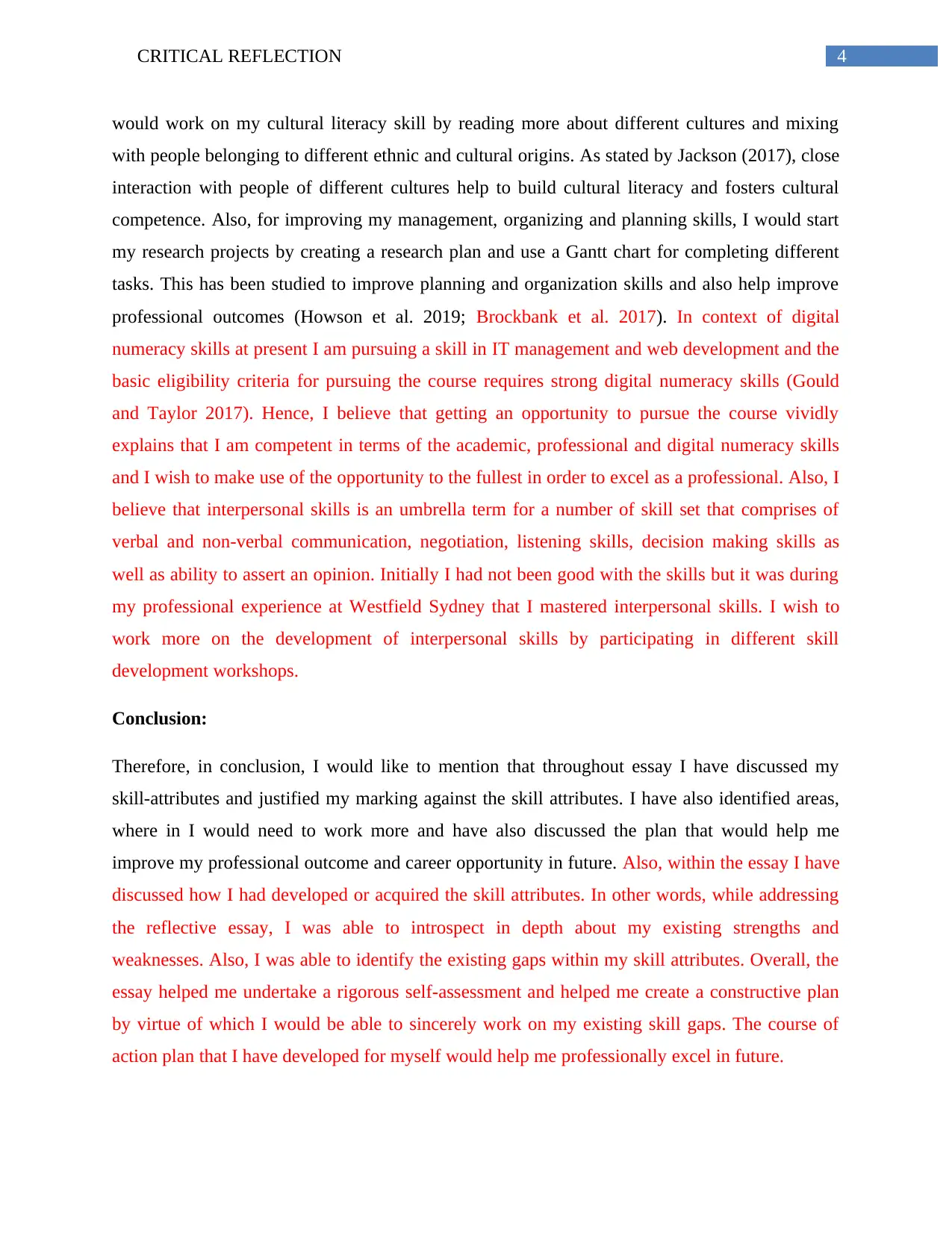
4CRITICAL REFLECTION
would work on my cultural literacy skill by reading more about different cultures and mixing
with people belonging to different ethnic and cultural origins. As stated by Jackson (2017), close
interaction with people of different cultures help to build cultural literacy and fosters cultural
competence. Also, for improving my management, organizing and planning skills, I would start
my research projects by creating a research plan and use a Gantt chart for completing different
tasks. This has been studied to improve planning and organization skills and also help improve
professional outcomes (Howson et al. 2019; Brockbank et al. 2017). In context of digital
numeracy skills at present I am pursuing a skill in IT management and web development and the
basic eligibility criteria for pursuing the course requires strong digital numeracy skills (Gould
and Taylor 2017). Hence, I believe that getting an opportunity to pursue the course vividly
explains that I am competent in terms of the academic, professional and digital numeracy skills
and I wish to make use of the opportunity to the fullest in order to excel as a professional. Also, I
believe that interpersonal skills is an umbrella term for a number of skill set that comprises of
verbal and non-verbal communication, negotiation, listening skills, decision making skills as
well as ability to assert an opinion. Initially I had not been good with the skills but it was during
my professional experience at Westfield Sydney that I mastered interpersonal skills. I wish to
work more on the development of interpersonal skills by participating in different skill
development workshops.
Conclusion:
Therefore, in conclusion, I would like to mention that throughout essay I have discussed my
skill-attributes and justified my marking against the skill attributes. I have also identified areas,
where in I would need to work more and have also discussed the plan that would help me
improve my professional outcome and career opportunity in future. Also, within the essay I have
discussed how I had developed or acquired the skill attributes. In other words, while addressing
the reflective essay, I was able to introspect in depth about my existing strengths and
weaknesses. Also, I was able to identify the existing gaps within my skill attributes. Overall, the
essay helped me undertake a rigorous self-assessment and helped me create a constructive plan
by virtue of which I would be able to sincerely work on my existing skill gaps. The course of
action plan that I have developed for myself would help me professionally excel in future.
would work on my cultural literacy skill by reading more about different cultures and mixing
with people belonging to different ethnic and cultural origins. As stated by Jackson (2017), close
interaction with people of different cultures help to build cultural literacy and fosters cultural
competence. Also, for improving my management, organizing and planning skills, I would start
my research projects by creating a research plan and use a Gantt chart for completing different
tasks. This has been studied to improve planning and organization skills and also help improve
professional outcomes (Howson et al. 2019; Brockbank et al. 2017). In context of digital
numeracy skills at present I am pursuing a skill in IT management and web development and the
basic eligibility criteria for pursuing the course requires strong digital numeracy skills (Gould
and Taylor 2017). Hence, I believe that getting an opportunity to pursue the course vividly
explains that I am competent in terms of the academic, professional and digital numeracy skills
and I wish to make use of the opportunity to the fullest in order to excel as a professional. Also, I
believe that interpersonal skills is an umbrella term for a number of skill set that comprises of
verbal and non-verbal communication, negotiation, listening skills, decision making skills as
well as ability to assert an opinion. Initially I had not been good with the skills but it was during
my professional experience at Westfield Sydney that I mastered interpersonal skills. I wish to
work more on the development of interpersonal skills by participating in different skill
development workshops.
Conclusion:
Therefore, in conclusion, I would like to mention that throughout essay I have discussed my
skill-attributes and justified my marking against the skill attributes. I have also identified areas,
where in I would need to work more and have also discussed the plan that would help me
improve my professional outcome and career opportunity in future. Also, within the essay I have
discussed how I had developed or acquired the skill attributes. In other words, while addressing
the reflective essay, I was able to introspect in depth about my existing strengths and
weaknesses. Also, I was able to identify the existing gaps within my skill attributes. Overall, the
essay helped me undertake a rigorous self-assessment and helped me create a constructive plan
by virtue of which I would be able to sincerely work on my existing skill gaps. The course of
action plan that I have developed for myself would help me professionally excel in future.
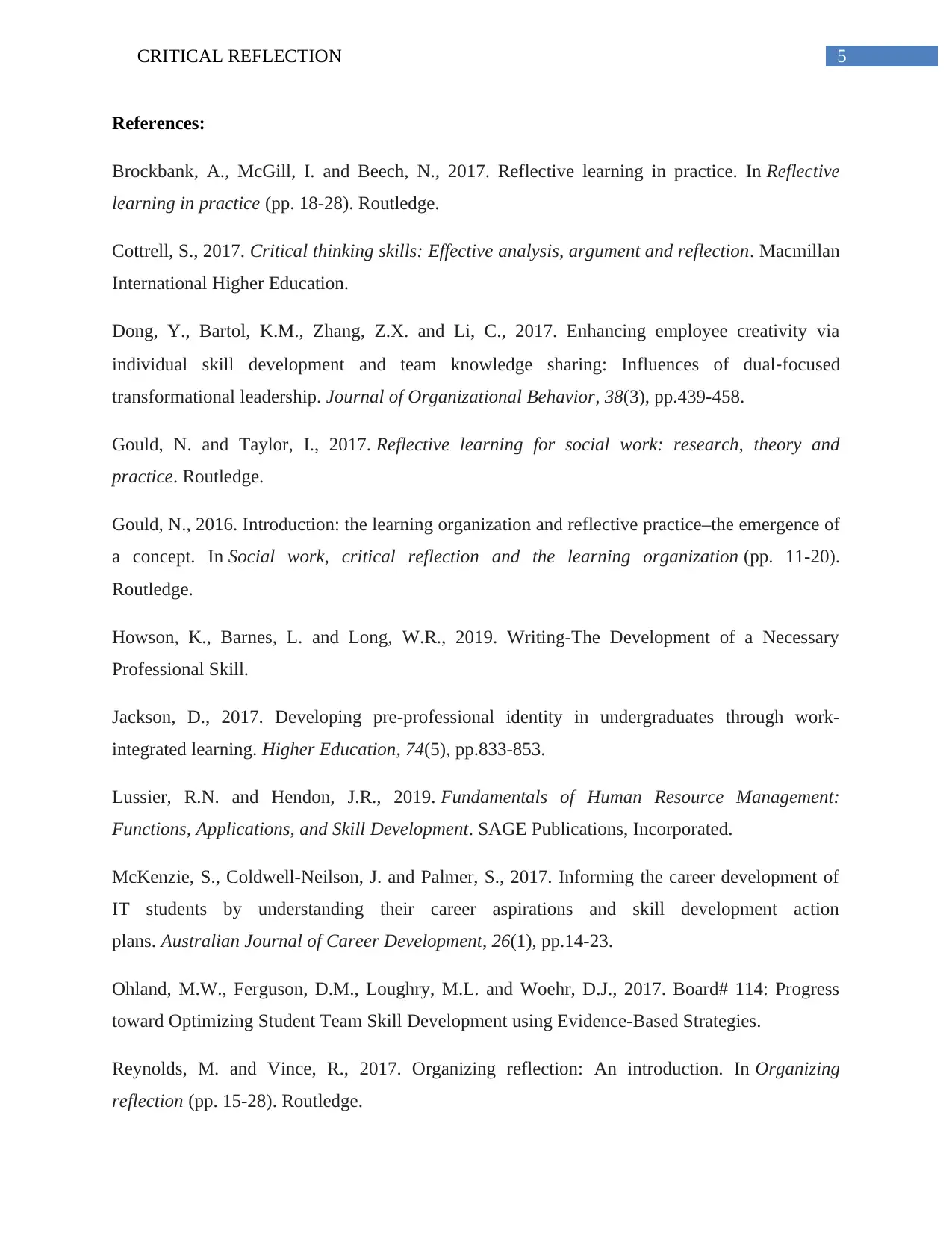
5CRITICAL REFLECTION
References:
Brockbank, A., McGill, I. and Beech, N., 2017. Reflective learning in practice. In Reflective
learning in practice (pp. 18-28). Routledge.
Cottrell, S., 2017. Critical thinking skills: Effective analysis, argument and reflection. Macmillan
International Higher Education.
Dong, Y., Bartol, K.M., Zhang, Z.X. and Li, C., 2017. Enhancing employee creativity via
individual skill development and team knowledge sharing: Influences of dual‐focused
transformational leadership. Journal of Organizational Behavior, 38(3), pp.439-458.
Gould, N. and Taylor, I., 2017. Reflective learning for social work: research, theory and
practice. Routledge.
Gould, N., 2016. Introduction: the learning organization and reflective practice–the emergence of
a concept. In Social work, critical reflection and the learning organization (pp. 11-20).
Routledge.
Howson, K., Barnes, L. and Long, W.R., 2019. Writing-The Development of a Necessary
Professional Skill.
Jackson, D., 2017. Developing pre-professional identity in undergraduates through work-
integrated learning. Higher Education, 74(5), pp.833-853.
Lussier, R.N. and Hendon, J.R., 2019. Fundamentals of Human Resource Management:
Functions, Applications, and Skill Development. SAGE Publications, Incorporated.
McKenzie, S., Coldwell-Neilson, J. and Palmer, S., 2017. Informing the career development of
IT students by understanding their career aspirations and skill development action
plans. Australian Journal of Career Development, 26(1), pp.14-23.
Ohland, M.W., Ferguson, D.M., Loughry, M.L. and Woehr, D.J., 2017. Board# 114: Progress
toward Optimizing Student Team Skill Development using Evidence-Based Strategies.
Reynolds, M. and Vince, R., 2017. Organizing reflection: An introduction. In Organizing
reflection (pp. 15-28). Routledge.
References:
Brockbank, A., McGill, I. and Beech, N., 2017. Reflective learning in practice. In Reflective
learning in practice (pp. 18-28). Routledge.
Cottrell, S., 2017. Critical thinking skills: Effective analysis, argument and reflection. Macmillan
International Higher Education.
Dong, Y., Bartol, K.M., Zhang, Z.X. and Li, C., 2017. Enhancing employee creativity via
individual skill development and team knowledge sharing: Influences of dual‐focused
transformational leadership. Journal of Organizational Behavior, 38(3), pp.439-458.
Gould, N. and Taylor, I., 2017. Reflective learning for social work: research, theory and
practice. Routledge.
Gould, N., 2016. Introduction: the learning organization and reflective practice–the emergence of
a concept. In Social work, critical reflection and the learning organization (pp. 11-20).
Routledge.
Howson, K., Barnes, L. and Long, W.R., 2019. Writing-The Development of a Necessary
Professional Skill.
Jackson, D., 2017. Developing pre-professional identity in undergraduates through work-
integrated learning. Higher Education, 74(5), pp.833-853.
Lussier, R.N. and Hendon, J.R., 2019. Fundamentals of Human Resource Management:
Functions, Applications, and Skill Development. SAGE Publications, Incorporated.
McKenzie, S., Coldwell-Neilson, J. and Palmer, S., 2017. Informing the career development of
IT students by understanding their career aspirations and skill development action
plans. Australian Journal of Career Development, 26(1), pp.14-23.
Ohland, M.W., Ferguson, D.M., Loughry, M.L. and Woehr, D.J., 2017. Board# 114: Progress
toward Optimizing Student Team Skill Development using Evidence-Based Strategies.
Reynolds, M. and Vince, R., 2017. Organizing reflection: An introduction. In Organizing
reflection (pp. 15-28). Routledge.
⊘ This is a preview!⊘
Do you want full access?
Subscribe today to unlock all pages.

Trusted by 1+ million students worldwide
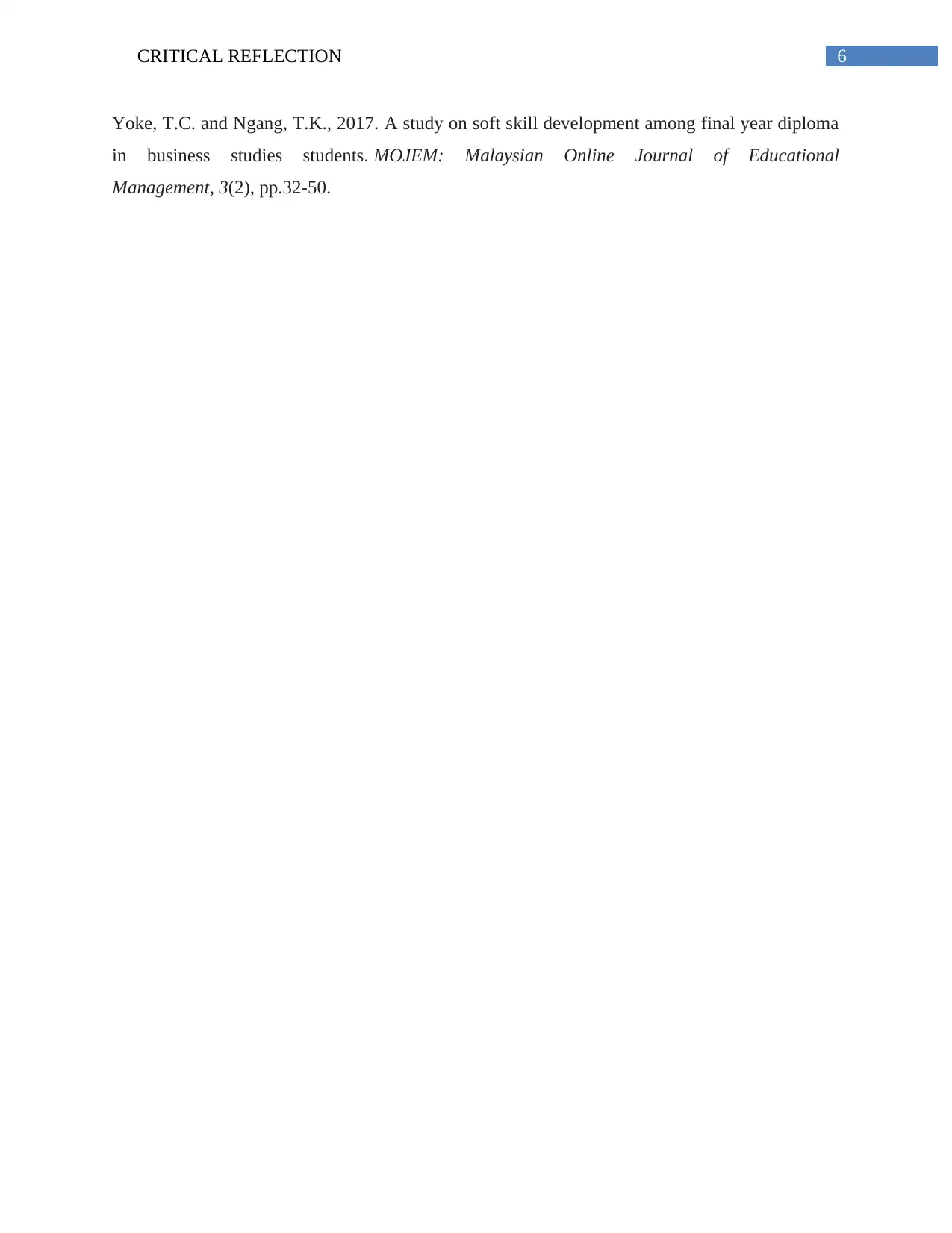
6CRITICAL REFLECTION
Yoke, T.C. and Ngang, T.K., 2017. A study on soft skill development among final year diploma
in business studies students. MOJEM: Malaysian Online Journal of Educational
Management, 3(2), pp.32-50.
Yoke, T.C. and Ngang, T.K., 2017. A study on soft skill development among final year diploma
in business studies students. MOJEM: Malaysian Online Journal of Educational
Management, 3(2), pp.32-50.
1 out of 7
Related Documents
Your All-in-One AI-Powered Toolkit for Academic Success.
+13062052269
info@desklib.com
Available 24*7 on WhatsApp / Email
![[object Object]](/_next/static/media/star-bottom.7253800d.svg)
Unlock your academic potential
Copyright © 2020–2026 A2Z Services. All Rights Reserved. Developed and managed by ZUCOL.





